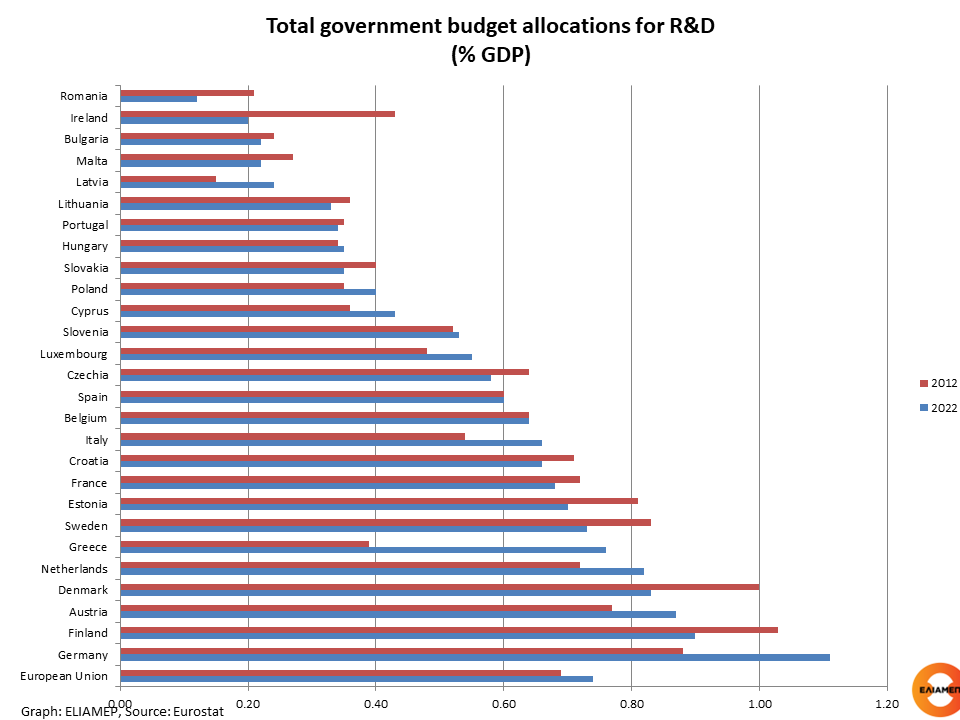Public and private investment in research and development (the well-known R&D) is fundamental for the promotion of innovation, for the competitiveness of the economy, but also for dealing with important social problems such as climate change. Research and technological development helps Europe to regain its strategic autonomy and preserve its competiveness in the global arena. Consequently, research and development are closely linked to European Union’s key priorities such as the green and digital transition.
In 2022, the total government budget allocation for R&D across the EU stood at €117, 3 billion (0.74% of GDP). In 2022, the biggest share of the government budget allocation for R&D, namely 35.5%, was directed to the general advancement of knowledge financed in a large majority by a public block grant known as public general university funds, which many public higher education institutions receive to support all their activities. Next, 16.5% was invested for the general advancement of knowledge from other sources going to different institutions, followed by 10.2% to industrial production and technology, 8.3% to health and 5.9% to exploration and exploitation of space. A significant increase was observed in defense (from 2.6% in the previous year to 4.2% in 2022)
The countries with the highest total government budget allocations for R&D in 2022 were Germany (43 billion Euros), France (17.8 billion) and Italy (12.6 billion). As a percentage of GDP, Germany was again in first place with the highest total government budget allocations for R&D (1.1% of GDP), followed by Finland (0,9%), Austria (0.87%) and Denmark (0.83% of GDP). At the bottom of the ranking were Romania (0.12% of GDP) and Ireland (0.20%), while in Bulgaria and Malta total government budget allocation for R&D was 0.22% of GDP.
Between 2012 and 2022, all EU governments increased their budget allocations for R&D as a percentage of GDP (from 0.69% of GDP in 2012 to 0.74% of GDP in 2022). However, during the same period, 14 Member States reported a decrease in their budget allocations for R&D as a percentage of GDP. More particularly, the largest decrease in public expenditure on R&D as a percentage of GDP is recorded in Ireland (from 0.43% of GDP in 2012 to 0.20% in 2022)- although in this country the relative size is affected by the change in the calculation of GDP-. Also, in Denmark and Finland spending on R&D fell significantly as a percentage of GDP (from 1% and 1.03% of GDP in 2012 to 0.83% and 0.9% in 2022 respectively) but still in these two countries governments allocate more on R&D than the European average. On the contrary, the largest increases in the shares of the government budget allocations as a percentage of GDP were recorded in Italy (from 0.54% to 0.66% of GDP), Germany (from 0.88% to 1.1% of GDP) and Greece (from 0.39% in 2012 to 0.76% of GDP in 2022).
Indeed, in 2022 Greece was in 6th place in the EU ranking based on total government budget allocations for R&D as a percentage of GDP, and in 16th place based on absolute figures (1.6 billion). Public expenditure on R&D (which has been very low in the past) is now slightly above the European average. It should be noted that the expenditure on R&D in Greece and in other countries is financed both by the governments’ budget and by European structural funds. Now, recourses from the Recovery Fund will also be allocated for R&D.
Yet, Greece still lags behind in terms of private spending on R&D. While in the EU as a whole 58% of total R&D expenditure comes from businesses, Greek businesses share does not exceed 40% of total R&D spending. For this reason, the total expenditure on R&D in our country (private and public) is still significantly below the European average (1.45% of GDP in Greece compared to 2.26% in the EU).
The new tax framework provides incentives to boost private spending on R&D in Greece. In particular, according to the Law 4712/2020, the entire expenditure of companies on research and development is deducted from the taxable amount (compared to only 30% before 2020).
It is also worth mentioning that despite the significant increase in public spending on R&D, the commercial use of the research findings from universities and research centers remains low. According to recent research, an important reason for this is the lack of cooperation between universities, research centers with the industry and the business sector.
Maintaining public spending for R&D at high levels, while also increasing private spending, is a necessary condition for upgrading the production model of the Greek economy. But, it is not enough: it should be accompanied by the adoption of good practices from pioneering countries (e.g. technology platforms that connect universities and companies, University business incubators), but also by the resolution of chronic bureaucratic constraints (e.g. simplified but transparent procedures for funding research and investment proposals).




